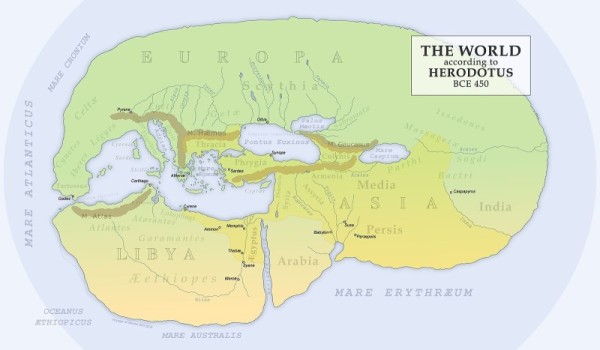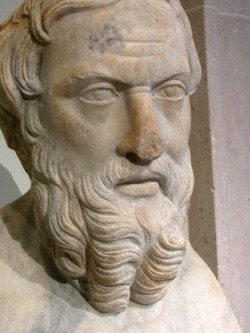Thus it continues to be winter for eight months, and even for the remaining four it is cold in those parts. This winter is distinguished in its character from all the winters which come in other parts of the world; for in it there is no rain to speak of at the usual season for rain, whereas in summer it rains continually . . . .

Translated by George C. Macaulay — our special project presenting the complete Herodotus with URLs for all of those people, places, events, and things which baffles and discourages modern readers.
Previously on Herodotus.
24. Now as far as these bald-headed men there is abundantly clear information about the land and about the nations on this side of them; for not only do certain of the Scythians go to them, from whom it is not difficult to get information, but also some of the Hellenes who are at the trading-station of the Borysthenes and the other trading-places of the Pontic coast: and those of the Scythians who go to them transact their business through seven interpreters and in seven different languages.
25. So far as these, I say, the land is known; but concerning the region to the North of the bald-headed men no one can speak with certainty, for lofty and impassable mountains divide it off, and no one passes over them. However these bald-headed men say (though I do not believe it) that the mountains are inhabited by men with goats’ feet; and that after one has passed beyond these, others are found who sleep through six months of the year. This I do not admit at all as true. However, the country to the East of the bald-headed men is known with certainty, being inhabited by the Issedonians, but that which lies beyond both the bald-headed men and the Issedonians towards the North Wind is unknown, except so far as we know it from the accounts given by these nations which have just been mentioned.
26. The Issedonians are said to have these customs:—when a man’s father is dead, all the relations bring cattle to the house, and then having slain them and cut up the flesh, they cut up also the dead body of the father of their entertainer, and mixing all the flesh together they set forth a banquet. His skull however they strip of the flesh and clean it out and then gild it over, and after that they deal with it as a sacred thing and perform for the dead man great sacrifices every year. This each son does for his father, just as the Hellenes keep the day of memorial for the dead. In other respects however this race also is said to live righteously, and their women have equal rights with the men.
27. These then also are known; but as to the region beyond them, it is the Issedonians who report that there are there one-eyed men and gold-guarding griffins; and the Scythians report this having received it from them, and from the Scythians we, that is the rest of mankind, have got our belief; and we call them in Scythian language Arimaspians, for the Scythians call the number one arima and the eye spu.

CC BY-SA 2.0 image from Wikipedia.
28. This whole land which has been described is so exceedingly severe in climate, that for eight months of the year there is frost so hard as to be intolerable; and during these if you pour out water you will not be able to make mud, but only if you kindle a fire can you make it; and the sea is frozen and the whole of the Kimmerian Bosphorus, so that the Scythians who are settled within the trench make expeditions and drive their wagons over into the country of the Sindians. Thus it continues to be winter for eight months, and even for the remaining four it is cold in those parts. This winter is distinguished in its character from all the winters which come in other parts of the world; for in it there is no rain to speak of at the usual season for rain, whereas in summer it rains continually; and thunder does not come at the time when it comes in other countries, but is very frequent, in the summer; and if thunder comes in winter, it is marvelled at as a prodigy: just so, if an earthquake happens, whether in summer or in winter, it is accounted a prodigy in Scythia. Horses are able to endure this winter, but neither mules nor asses can endure it at all, whereas in other countries horses if they stand in frost lose their limbs by mortification, while asses and mules endure it.
29. I think also that it is for this reason that the hornless breed of oxen in that country have no horns growing; and there is a verse of Homer in the Odyssey supporting my opinion, which runs this:—
Also the Libyan land, where the sheep very quickly grow hornèd,
for it is rightly said that in hot regions the horns come quickly, whereas in extreme cold the animals either have no horns growing at all, or hardly any.
30. In that land then this takes place on account of the cold; but (since my history proceeded from the first seeking occasions for digression) I feel wonder that in the whole land of Elis mules cannot be bred, though that region is not cold, nor is there any other evident cause. The Eleians themselves say that in consequence of some curse mules are not begotten in their land; but when the time approaches for the mares to conceive, they drive them out into the neighboring lands and there in the land of their neighbors they admit to them the he-asses until the mares are pregnant, and then they drive them back.
31. As to the feathers of which the Scythians say that the air is full, and that by reason of them they are not able either to see or to pass through the further parts of the continent, the opinion which I have is this:—in the parts beyond this land it snows continually, though less in summer than in winter, as might be supposed. Now whomsoever has seen close at hand snow falling thickly, knows what I mean without further explanation, for the snow is like feathers: and on account of this wintry weather, being such as I have said, the Northern parts of this continent are uninhabitable. I think therefore that by the feathers the Scythians and those who dwell near them mean symbolically the snow. This then which has been said goes to the furthest extent of the accounts given.
– Herodotus, Book IV
| <—Previous | Master List | Next—> |
Herodotus made his living by being interesting. In a world where most people did not read and could not afford to buy a book even if they could, they would pay to listen to Herodotus recite from his books. They would not pay to be bored. In that world, the names that populate his stories would have some general familiarity to his audience. Their obscurity to us is a barrier that this series seeks to break down.
MORE INFORMATION
MAP LIBRARY
Because of lack of detail in maps as embedded images, we are providing links instead, enabling readers to view them full screen.

Leave a Reply
You must be logged in to post a comment.